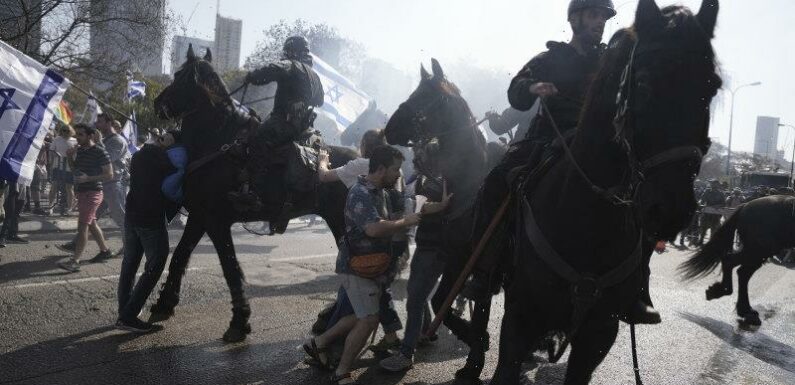
Israel was rocked by further protests against the government’s planned judicial overhaul in the wake of increased violence in the West Bank, but Prime Minister Benjamin Netanyahu seemed determined to hold his ground.
Demonstrators against the state’s bid to restrict the authority of the Supreme Court blocked main roadways on Wednesday (Tel Aviv time), including the key Jerusalem-Tel Aviv highway. Thirty-nine were arrested in the latest skirmish in a controversy that’s caused a deep social rift and sparked shekel volatility and unnerved markets and investors.
Israeli police deploy horses and stun grenades to disperse Israelis blocking a main road to protest against plans by Prime Minister Benjamin Netanyahu’s new government to overhaul the judicial system, in Tel Aviv.Credit:AP
Unrest in Palestinian villages has led to fights between soldiers and Jewish settlers in recent days, intensifying the worst hostilities in years. Eight Israelis were arrested on suspicion of their involvement in the violence and an assault in the village of Huwara.
Police said they expected to detain more.
The twin battles have increased concerns about an escalating crisis in Israel since Netanyahu returned to power as head of a far-right coalition in December.
Critics say plans for the judiciary will hand too much power to authorities, and a committee debate about the reforms in the Knesset on Wednesday turned raucous.
Israeli police deploy a water cannon to disperse Israelis blocking a main road to protest Prime Minister Benjamin Netanyahu’s plans to overhaul the nation’s judicial system.Credit:AP
The government and its supporters say they are reining in an activist high court and returning power to the voters. The rift over this issue is genuine but also a proxy for the socio-economic divide between traditional, more religious Jews and secular professionals.
“Israel is on the brink of internal disintegration and severe social rift,” Yuval Diskin, former head of Israel’s domestic security agency, the Shin Bet, said at a demonstration. “It came much faster than I expected. We are liable to be on the brink of civil war, and this is because of our miserable government.”
Protesters and opposition lawmakers criticised the use of stun grenades, water cannons and horses to push back demonstrators. Eleven were wounded. Netanyahu said police should use whatever means necessary to stop demonstrators from blocking highways and what he said were attacks against officers.
In an unplanned televised address on Wednesday evening, Netanyahu compared some of the demonstrations to what had happened in the West Bank.
A Palestinian carries stones during clashes with Israeli forces near the West Bank city of Jericho.Credit:AP
“We won’t accept law breaking and violence, not in Huwara, not in Tel Aviv, not anywhere,” he said, grim-faced from the podium. “I once again call for calm, I call for an end to the violence and I believe and hope that we will soon find a way toward dialogue and agreements.”
In the Knesset, the plenum approved in a preliminary vote a bill that will protect Netanyahu, on trial for bribery and breach of trust, from a forced leave of absence, preventing the High Court from recusing him.
A second bill calling for the death sentence for Palestinians carrying out attacks against Israel also passed a preliminary vote. Both must be approved three more times before coming law.
Violence worsening
The rage in the streets is led by secular liberals who fear the government is pulling the nation toward religious nationalist policies.
Every Saturday night for the last eight weeks, at least 100,000 have gathered in Tel Aviv. On Wednesday, an annual conference of the Institute for National Security Studies, an establishment foreign-policy think tank, was blocked by protesters waving flags and shouting slogans over the judicial changes.
In a meeting in Aqaba on Monday, Israel and the Palestinian Authority agreed to work to stop the clashes, though this was undermined the same day when a young Israeli-American man was shot and killed in the West Bank.
There are fears the violence could worsen, as the Islamic holiday of Ramadan and Jewish celebration of Passover loom in early April.
Sixty-two Palestinians have been killed by Israeli troops since the beginning of the year, according to the Palestinian Ministry of Health, alongside 14 Israelis — both the highest number in years.
“The country is in a dark age,” opposition lawmaker Efrat Rayten Marom said at the law committee meeting.
Bloomberg
Get a note directly from our foreign correspondents on what’s making headlines around the world. Sign up for the weekly What in the World newsletter here.
Most Viewed in World
From our partners
Source: Read Full Article


